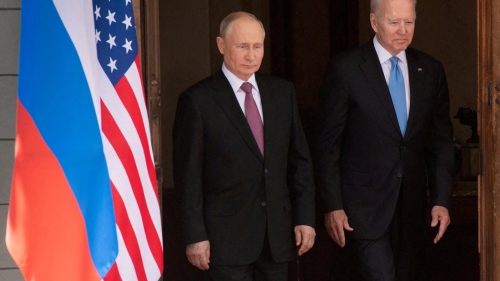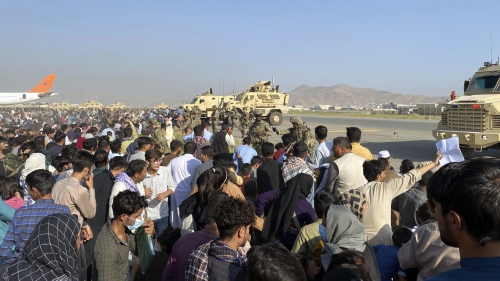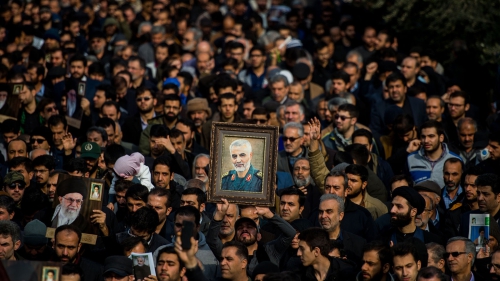Don't Forget Iraq
As the world's attention focused on Kosova, other human tragedies continued without much media coverage or interest. Of these, Iraq stands out, as Kosova's saviors happen to also be the perpetrators of crimes against Iraqi civilians.
Throughout the Kosova crisis, U.S. and British forces continued their activity in the "no-fly" zones over northern and southern Iraq. The United States, Britain and France declared these zones in 1991 and 1992. Though the zones have no U.N. authorization and despite the fact that France no longer considers them legal, American and British forces continue to blatantly violate the sovereignty of a nation -- this in addition to the Anglo-U.S. alliance's refusal to lift or ease the sanctions that continue to devastate Iraq's population.
In this tussle between Iraqi president Saddam Hussein and the equally obstinate western powers, the desperate plight of the Iraqi people caught in the middle has been virtually ignored. The mainstream media has done little coverage of the humanitarian crisis in Iraq. And while politicians and intellectuals -- from both the left and right of the political spectrum -- have openly voiced concern about innocent Serb victims of NATO bombings, very few have come to the aid of Iraqis who have suffered for the past nine years.
The average Iraqi, who has no say in the policies pursued by the government in Baghdad, faces extensive food and medical shortages, hyperinflation and rampant urban unemployment. The chaos has contributed to the growth of the black market where prices are so exorbitant that more and more people have turned to government food rations which provide only a fraction of the necessary caloric and nutritional requirements, leading to malnutrition and other related diseases.
In most parts of the country, water and sanitation systems are not functioning at full capacity, resulting in outbreaks of cholera, typhoid, gastroenteritis, malaria, hepatitis, meningitis and other infectious diseases. The situation is so critical that UNICEF officials announced years ago that there was a resurgence of vaccine-preventable diseases.
It should not have taken a rocket scientist to conclude that the sanctions would have such a profound effect, given that Iraq imported almost 70 per cent of its food prior to the Gulf War. In fact, the U.N. Food and Agricultural Organization warned as early as July, 1993 that pre-famine conditions existed in the country. Moreover, according to UNICEF, more than 1.5 million have reportedly died due to the sanctions.
Deplorably, the sanctions have an inordinate impact on the most vulnerable - the children. More than 4,500 children under the age of five die each month, as opposed to 700 before the war. The mortality rate among those older than the age of five is now 6,500 per month, compared with 1,800 per month before the war. Even if we don't accept these figures at face value, are any innocent lives disposable?
The Iraqi government directs the accusatory finger at the United Nations and the West, the U.S. and Britain in particular. Western nations, in turn, blame Hussein's regime. They point to the many U.N.
resolutions they have passed, which they claim are for the benefit of the Iraqi people. Resolution 688 calls on Baghdad to stop repressing its own citizens. But one has to stop and think: Are the American/British bombing raids and sanctions not repressing Iraqi citizens?
Many also point to Resolutions, 706 and 712, which propose the supply of food, medicine and other humanitarian goods under U.N. observation. The funding is to come from U.N. authorized oil sales, which Iraq has been unable to take advantage of fully due to lack of spare parts for its refineries. Moreover, a significant proportion of the funds from the sales must also go to fund the U.N. reparations committee and U.N. humanitarian and monitoring operations. And naturally Iraq objects to this arrangement as a violation of its sovereignty.
The West's obsession with removing Saddam, who has survived more than fifteen years of virtually continuous warfare, internal dissention, assassination attempts and sanctions, has blinded the public to the suffering of innocent children, women and men. And every few weeks for the past nine years, politicians have quarreled over geopolitical issues in New York while millions in Iraq continue their miserable existence.
This week, the Security Council debated three proposals put forth by Britain, France and Russia to suspend the sanctions. The United States favors the Anglo-Dutch proposal, while the Iraqis oppose it. The Anglo-Dutch resolution calls for the suspension of sanctions for intervals of 120 days if Iraq complies with U.N. demands to dismantle its weapons program. Iraq would be allowed to export its oil freely but would have to also submit to strict financial controls on revenues from the sales.
In contrast, the French proposal calls for the suspension of all sanctions, including imports, for renewable periods of 100 days if Baghdad cooperates with a new weapons monitoring regime. It also calls for a less stringent revenue control mechanism.
The Russian draft calls for a complete and indefinite lifting of sanctions once a monitoring system is put in place.
One can only hope that something positive will come out of these Security Council talks. The world cannot sit by as Iraqis continue to suffer while Saddam and his inner circle feel no pain.
Faisal Kutty is Toronto lawyer and writer and is also a columnist for the Washington Report On Middle East Affairs.

















